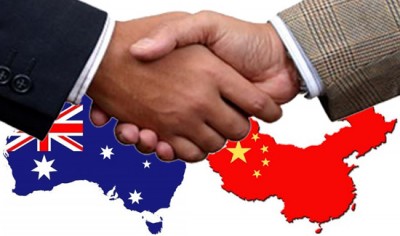Triumphing over Reality: China, Australia and Free Trade

The suspended reality across the Pacific took hold as the Australian Foreign Minister, Julie Bishop, conversed with her Chinese counterpart, Wang Yi, in a state of mild delusion. Assuming the air of a clairvoyant, Bishop insisted that she knew that the United States would not repudiate its own free trade agreement with Australia.
Knowledge, however, soon changed to disbelief. “I can’t believe it,” she is reported to have said. “I don’t take it credibly.” Surely, the United States would not withdraw from the Australian-US free trade agreement, its own brainchild and inspiration. The trade balance favoured the US in any case. The paternal figure would eventually make sense, and step back from the precipice of madness.
Observers should have immediately noted the perverse scenario. Australia had been shown up by the agreement to be distinctly outplayed and outdone in its trade with the US. (Some states simply have a freer regime than others.)
It was a lesson in diplomatic failure: poorly briefed officials facing far more experienced teams nourished by international trade conventions; a chronic inability on the part of Canberra to identify a coherent interest in even having such an arrangement with Washington.
Touted as the great producer of jobs and an economic boost, the agreement has served Washington’s interests far more than Canberra’s, who could probably do with its scrapping. The US trade surplus has ballooned from $14 billion a year to $25 billion a decade after it came into force.
The air of unreality was also to be found across in Washington, where a form of medicated denial had taken hold of Australia’s officials. In Washington, Australia’s ambassador, the lumbering Joe Hockey, could merely observe with bewilderment that, “By ratifying the TPP, the United States will ensure it will continue to have a major leadership role in the Asia-Pacific region…. The cost of failure may well be too great to imagine.” Always lacking imagination, Hockey’s apocalyptic scenarios were left open and unspecific.
With more than a hint of irony, the TPP was the very same trade bloc that was designed as a buffer against a belligerently confident China, despite Beijing’s willingness to join it. “When more than 95 per cent of our potential customers live outside our borders, we can’t let countries like China write the rules of the global economy.” So claimed that picture of modest imperialism, President Barack Obama. “We should write those rules…” Australia, trapped between marauding interests, could only squirm in both directions, hoping its elasticity would hold out.
Bishop was certainly in the mood to please, courting a more sympathetic China. “At a time of economic transition and uncertainty around the world, Australia reassures China that we are a reliable partner and that we shall continue to place a strong trade and economic relationship as one of our highest priorities.”[1]
Thinking what President Trump will do next is not the same as knowing it. At the moment, he has been good to his word in placing countries on a bilateral footing – in order of importance. The TPP has already had an ignominious funeral, and Trump’s officials are seeking a lucrative deal with Japan.
These movements are lost on Bishop. What matters is which golden bottom to sniff next, which cavity of power to survey. This self-inflicted Australian dilemma necessitates the snake-like crawl across diplomatic tables: what can we do for you, sir, comes the sibilant inquiry?
In the case of the United States, Australia remains a military and satellite installation of some importance, a ready-made Gurkha outfit happy to dive in with US forces into any distant theatre of operation. But in terms of economic worth, China tends to be the power to please with prostate willingness, the consumer of Australian commodities and driver of demand for iron ore.
Navigating between these two geopolitical hegemons is never easy, though the spectacle, when it involves officials from Canberra, tends to be embarrassing. Discussing free trade with a Communist state, while deciding to discount the views of a newly elected presidential administration in the US, was one of the more peculiar ones.
Wang showed continued interest in keeping the globalisation bandwagon moving, despite populist reactions in Europe and the United States. “It is important to steer economic globalisation towards greater inclusiveness, broader shared benefit and in a more sustainable way.” China, in other words, was edging towards global leadership.
Taking every cue from the US trade mission philosophy, Wang was keen that every state “firmly uphold the international trading regime with the WTO at the core and we need to promote trade and investment liberalisation and facilitation and we need to take a firm stand against all forms of protectionism.” Beijing, it would seem, hopes for the last laugh.
Sources on the reaction of Wang to Bishop would make any alert critic cringe. According to the Sydney Morning Herald, “Mr Wang concluded his day with Ms Bishop by kissing her on both cheeks after dinner, an unprecedented gesture, much remarked upon by accompanying officials.”[2]
That is not all. Benevolent Beijing was informing Australia that it could have a cake of sorts and eat it too, continuing “to be an ally of the US, at the same time to be [a] comprehensive strategic partner for China.”[3] The Australian foreign minister would have been delighted at that. Dispensation from strategic neurosis – at long last granted.
Dr. Binoy Kampmark was a Commonwealth Scholar at Selwyn College, Cambridge. He lectures at RMIT University, Melbourne. Email: [email protected]
Notes
[1] http://www.sbs.com.au/news/article/2017/02/07/australias-relationship-china-could-not-be-stronger-bishop-says
[2] http://www.smh.com.au/federal-politics/political-news/julie-bishop-dismisses-donald-trumps-threat-to-tear-up-free-trade-agreement-20170209-gu9kb9.html
[3] http://www.smh.com.au/federal-politics/political-news/julie-bishop-dismisses-donald-trumps-threat-to-tear-up-free-trade-agreement-20170209-gu9kb9.html

